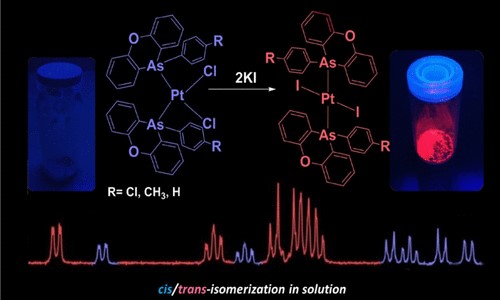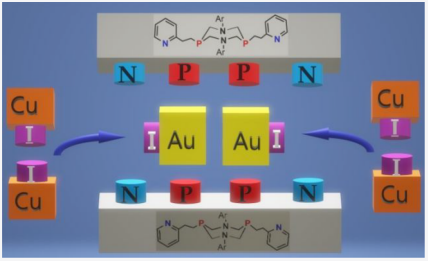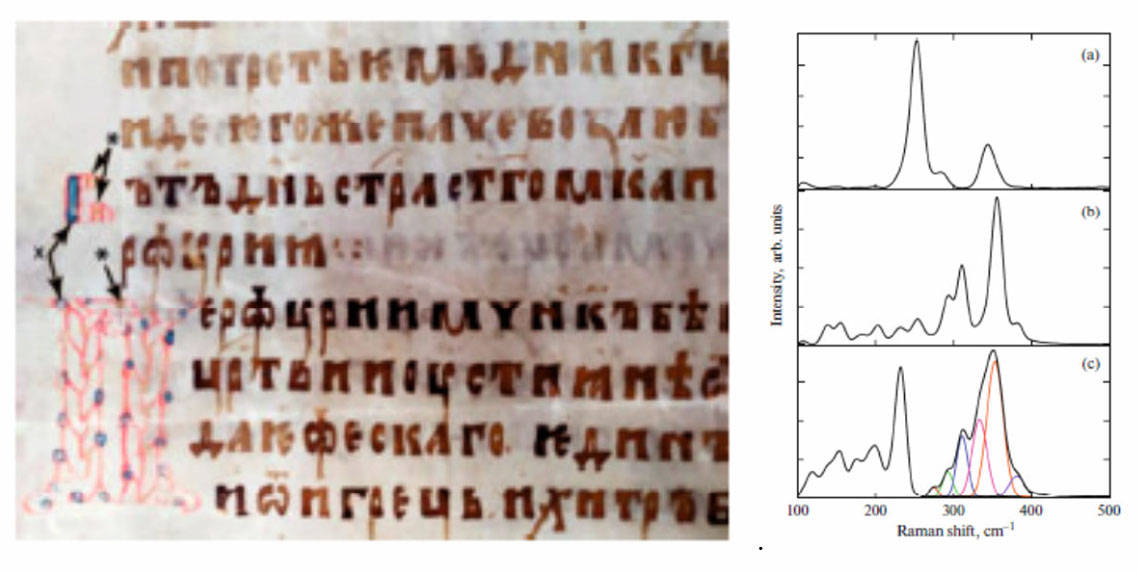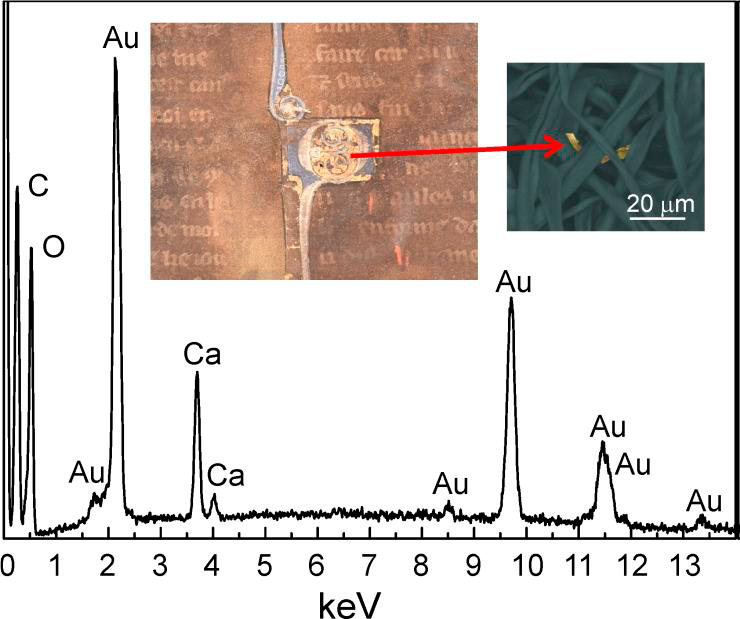Категория: Новости.
by M. Galimova, T. Begaliev, E. Zueva, S. Kondrashova, S. Latypov, A. Dobrynin, I. Kolesnikov, R. Musin, E. Musina, A. Karasik
Inorg. Chem. 2021, 60, 9, 6804–6812
https://doi.org/10.1021/acs.inorgchem.1c00672

Synthesis and structural and photophysical characterization of platinum dihalogenide complexes formulated as [PtHal2L2], where Hal = Cl and I, with different 10-(aryl)phenoxarsine ligands such as 10-(p-chlorophenyl)phenoxarsine, 10-(p-tolyl)phenoxarsine, and 10-(phenyl)phenoxarsine are reported. The structures of complexes were determined by NMR spectroscopy, mass spectrometry, and X-ray analysis. Cis/trans isomerism of the complexes in solution was studied by NMR spectroscopy. In the solid state, under UV irradiation, platinum diiodide trans complexes exhibit an intense orange-red emission, which was attributed to a metal halide-centered triplet state. The UV/vis absorption and emission properties were studied and rationalized by density functional theory (DFT) and time-dependent DFT calculations.
Категория: Новости.
by I. Dayanova, A. Shamsieva, I. Strelnik, T. Gerasimova, I. Kolesnikov, R. Fayzullin, D. Islamov, A. Saifina, E. Musina, E. Hey-Hawkins, A. Karasik
Inorg. Chem. 2021, 60, 7, 5402–5411
https://doi.org/10.1021/acs.inorgchem.1c00442

The row of metallocyclic dinuclear gold(I) complexes with cyclic diphosphines, namely, P-pyridylethyl-substituted 1,5-diaza-3,7-diphosphacyclooctanes, has been obtained. Further interaction of the dinuclear gold(I) complexes with copper(I) iodide gave the first examples of hexanuclear AuI/CuI complexes containing two unusual trinuclear AuICu2I2 fragments. The structures of di- and hexanuclear complexes were confirmed by NMR spectroscopy, ESI mass spectrometry, elemental analysis, and single-crystal X-ray diffraction. All of the obtained complexes are moderate emitters in the solid state. Dinuclear gold(I) complexes displayed a greenish emission with the maxima in the emission spectra at ca. 550 nm. The obtained hexanuclear heterobimetallic AuI/CuI complexes are triplet solid-state blue emitters with the maximum in the emission spectra at 463 and 484 nm. According to the TD-DFT calculations, the observed emission of all studied complexes had a triplet origin and was caused by the 3CC or 3(MLCT) T1 → S0 transitions for dinuclear and hexanuclear complexes, respectively.
Категория: Новости.
Д.В. Панькин, М.В. Корогодина, А.В. Поволоцкая, A.A. Михайлова, В.Г. Подковырова, Е.А. Тилева, И.В. Цевелева, А.Г. Сергеев, А.В. Курочкин
Оптика и спектроскопия, 2021, том 129, вып. 1
DOI: 10.21883/OS.2021.01.50447.227-20
Исследована палитра пигментов, входящих в состав пергаменного рукописного фрагмента из собрания Финляндских отрывков № 29 (Библиотека Российской академии наук, Финл. отр. 29, старый шифр — 4.9.28), датируемой XIV в. Данная рукопись с полихромными изображениями, использованными для украшения заглавных букв текста, не проходила реставрацию. В рамках выполненной работы методами спектроскопии КРС было установлено использование киновари для красных оттенков, идентифицирована смесь сера мышьяковых пигментов (аурипигмент и парареальгар), а также установлено использование смеси пигмента индиго и гипса в различных соотношениях для синих оттенков. Проведено исследование возможности детектирования характерной люминесценции обнаруженных пигментов с реальных (немодельных) образцов, при возбуждении лазерным излучением различных длин волн.
 (слева) Фотография декорированных заглавных букв, а так же части текста рукописного пергамена. (справа) Типичные спектры КРС красного пигмента – киновари и желтых – аурипигмента (b) и парареальгара (c)
(слева) Фотография декорированных заглавных букв, а так же части текста рукописного пергамена. (справа) Типичные спектры КРС красного пигмента – киновари и желтых – аурипигмента (b) и парареальгара (c)
Категория: Новости.
Уважаемые сотрудники, пользователи и коллеги, поздравляем вас с Новым 2021 Годом!
Пусть Новый Год оставит все проблемы и беды в прошлом и принесет вам достаток и здоровье, радость и счастье для вас и ваших близких, пусть вдохновение, успех и удача в работе, творчестве и исследованиях сопутствуют вам!

Категория: Новости.
by A. Povolotckaia, M.Korogodina, D. Pankin, V. Podkovyrova, N. Kurganov, E. Tileva, I. Tseveleva, A. Mikhailova, Y. Petrov, A. Povolotskiy, E. Borisov, A. Kurochkin
Journal of Cultural Heritage Vol. 46, pp. 298-303
https://doi.org/10.1016/j.culher.2020.06.011

This work presents the study of an XIII century French medieval Legendarium manuscript. The manuscript has a complex background of destruction and restoration attempts. Now the manuscript consists of 214 sheets encapsulated in polyethylene terephthalate conservation envelopes. The damaged manuscript sheets are in different states, some illustrations and text sections are in rather bad condition, some pages contain blurred traces of pigments and inks, which were used to write letters and make illustrations. Works carried out on this unique literary monument, included research using optical microscopy (OM), infrared reflectography (IRR), micro-Raman spectroscopy, and Scanning Electron Microscopy (SEM). The work was aimed at the estimation of the manuscript preservation and its current state. It has been demonstrated that even the study of micro-particles can be useful in the initial stages of the parchment manuscripts study that are in highly damaged condition. A wide variety of materials, which were used in different periods of time, have been found. Two types of red and four types of blue pigments were found in the studied particles from parchment. Locating the particles of iron-gall ink and pigments (for example, cinnabar and azurite) in the same region may indicate a possible use of this type of ink for both text and decoration. Pigments were revealed, the appearance of which date to a later time compared with the estimated date of Legendarium creations. These pigments include Prussian blue, pigments based on monoazo group and phthalocyanine blue. This contributes to the identification and localization of later interventions in the object under study, which were made both for the purpose of restoration and preservation.


 Русский (РФ)
Русский (РФ)  English (UK)
English (UK) 
 (слева) Фотография декорированных заглавных букв, а так же части текста рукописного пергамена. (справа) Типичные спектры КРС красного пигмента – киновари и желтых – аурипигмента (b) и парареальгара (c)
(слева) Фотография декорированных заглавных букв, а так же части текста рукописного пергамена. (справа) Типичные спектры КРС красного пигмента – киновари и желтых – аурипигмента (b) и парареальгара (c)
